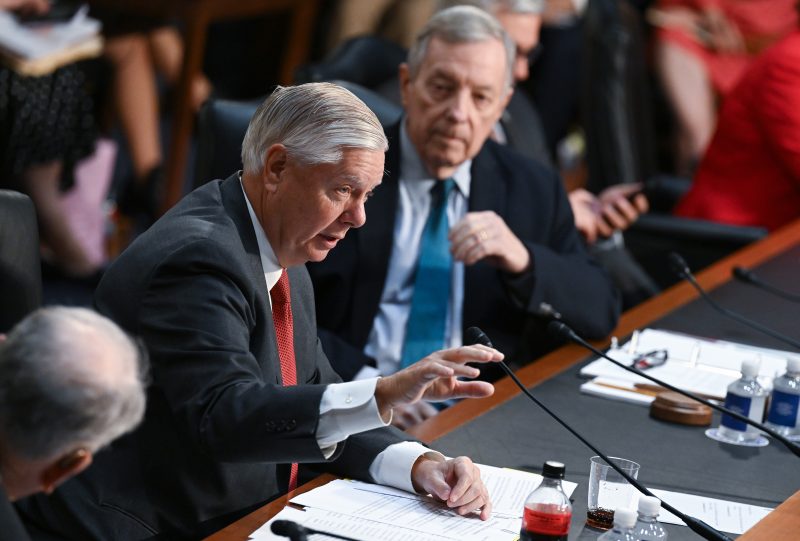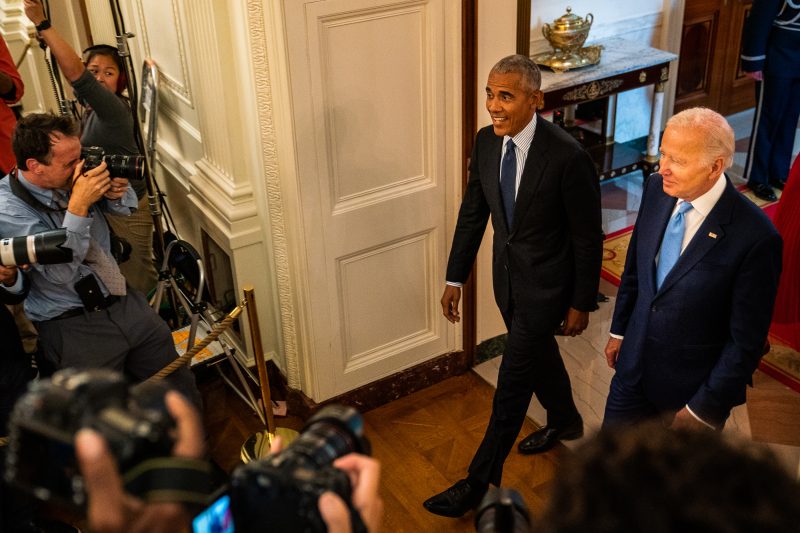Senate Dems postpone vote to subpoena allies of Justices Thomas, Alito

The Senate Judiciary Committee postponed its highly anticipated Thursday morning vote to subpoena a pair of close associates of two Supreme Court justices, after Republicans on the committee filed more than 90 amendments to slow the next phase of a months-long Supreme Court ethics inquiry.
Sen. Sheldon Whitehouse (D-R.I.), chairman of the Senate Judiciary subcommittee that oversees the federal courts, in a statement accused Republicans of “jamm[ing] the gears of the committee” as it seeks to understand the extent of the gifts and luxury trips Dallas billionaire Harlan Crow and conservative judicial activist Leonard Leo provided or helped arrange for Justices Clarence Thomas and Samuel A. Alito Jr.
“It was just too much to process,” he told reporters.
One of those amendments included subpoenas for Supreme Court Justice Sonia Sotomayor and her court staff following reports that the justice’s staffers encouraged public institutions — libraries, community colleges and universities — to purchase up to thousands of copies of her memoirs and children’s books ahead of her speaking engagements.
Sen. Charles E. Grassley (R-Iowa) described Thursday’s mood among committee Republicans to reporters this way: “If they’re gonna ask for subpoenas, we’re gonna ask for subpoenas.”
Taylor Reidy, Republican spokesperson for the committee, told The Washington Post that the top panel Republican, Sen. Lindsey O. Graham (R-S.C.), had warned Democrats “not to go down this road.”
“He said if it’s a fight they want, it’s a fight they will get,” Reidy said.
Whitehouse and Judiciary Committee Chairman Richard J. Durbin (D-Ill.) vowed to press forward, although it’s unclear when they might be able to hold a vote on the subpoenas.
“Senate Judiciary Committee Democrats remain united in our effort to implement an enforceable code of conduct for Supreme Court justices,” Durbin said in a statement. “To inform this effort, we will continue to pursue subpoena authorization for Harlan Crow and Leonard Leo — two individuals who have refused to comply with this Committee’s oversight requests for months.”
The subpoenas, which would be sent to Crow and Leo, demand a list of all transportation and lodging provided to any justices and their relatives; occasions in which they provided entrance to any members-only clubs and all gifts or payments provided to any justice worth more than $415, which is the maximum value allowed for unreported gifts to judges and justices.
“In order to inform our legislative efforts to establish an effective code of conduct, Congress needs to understand the full scope of the court’s ethical crisis,” Durbin said in his opening remarks, before the vote was delayed. “This is the legislative purpose for all the committee’s inquiries in this matter, including the subpoena authorization I’m requesting today.”
“If every federal judge is held to a standard of code of conduct and ethics, why do we exempt these nine individuals?” Durbin added. “We shouldn’t.”
A vote to issue the subpoenas would be the most aggressive step Democrats have taken yet to pressure the court to adopt an ethics code.
Committee Democrats have for months tried unsuccessfully to get the Supreme Court to adopt a formal code of ethics, following reports that Thomas and Alito accepted — and did not disclose — free luxury travel, real estate deals and gifts from Crow, Leo and conservative donor Robin Arkley II.
Senate Democrats had originally planned a vote to subpoena Arkley as well, but Durbin announced on Wednesday that he would no longer seek one after the California businessman provided the information the committee had requested.
But Leo and Crow have pushed back aggressively against the Democrats’ demands, defending not just themselves, but also Thomas and Alito. In lengthy letters citing past Supreme Court cases, lawyers for Crow and Leo said the committee’s requests are overly invasive, exceed the panel’s authority and are driven by politics, rather than a legitimate need for information to pass legislation.
Leo has refused to voluntarily provide the information over the past several months, while Crow offered to turn over a limited set of information that lawmakers said was insufficient.
If Leo or Crow do not comply with the subpoena, Democrats have two options. The Senate can seek civil enforcement of the subpoenas in court. That step requires a vote of the full Senate and would probably stall in the face of resistance from Republicans, who have dismissed the scrutiny of the justices as an effort to undermine the court’s conservative supermajority.
Or, the Senate could refer any failure to comply with a subpoena to the Justice Department for possible prosecution. The House voted last year to hold several Trump advisers in criminal contempt of Congress for defying subpoenas from the committee investigating the Jan. 6, 2021, attack on the Capitol. Those votes, mostly along party lines, sent the matter to the Justice Department.
Committee Democrats launched the probe into the justices’ relationships with private benefactors after ProPublica revealed in April that Thomas, for many years, failed to disclose on his annual reports free luxury vacations and private jet travel he received from Crow, his longtime friend. Thomas also did not initially report Crow’s purchase of three properties from Thomas and his relatives or that Crow paid the boarding school tuition for Thomas’s great-nephew, of whom Thomas had legal custody.
The investigative news site also revealed that Leo arranged for Alito to take a luxury fishing trip to Alaska in 2008 that included free lodging and private jet travel. The lodging, according to the ProPublica report, was provided by Arkley. Both Thomas and Alito have said they did not think they were required to report the trips in annual disclosure forms. After ethics rules were revised in March, making clear that judges and justices must report private jet travel, Thomas disclosed three 2022 trips on Crow’s jet. He also for the first time listed the 2014 real estate sale to Crow, a transaction that most ethics experts said should have been reported long ago.
Roberts and three other justices — Elena Kagan, Brett M. Kavanaugh and Amy Coney Barrett — have suggested the justices should adopt their own ethics policy. But past efforts to reach agreement have failed. In 2019, Kagan told a congressional committee that Roberts was seriously studying the issue.
In July, the Judiciary Committee advanced legislation that would require the high court to adopt an ethics code, create a system for investigating alleged violations of that code, and require justices to publicly explain recusal decisions. The bill lacks the bipartisan support necessary to clear the full Senate and would probably stall in the GOP-controlled House.
Ann E. Marimow contributed to this report.




